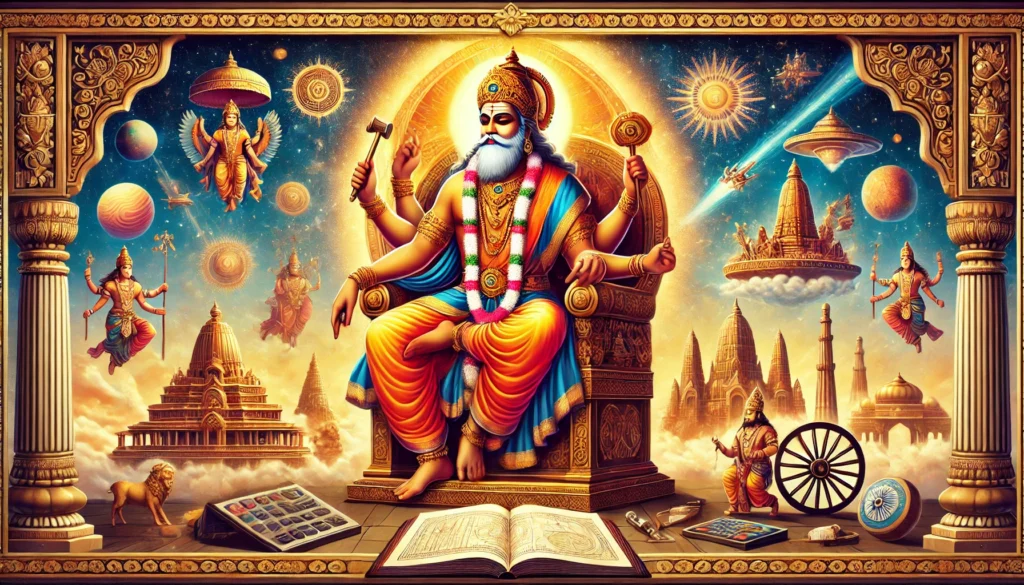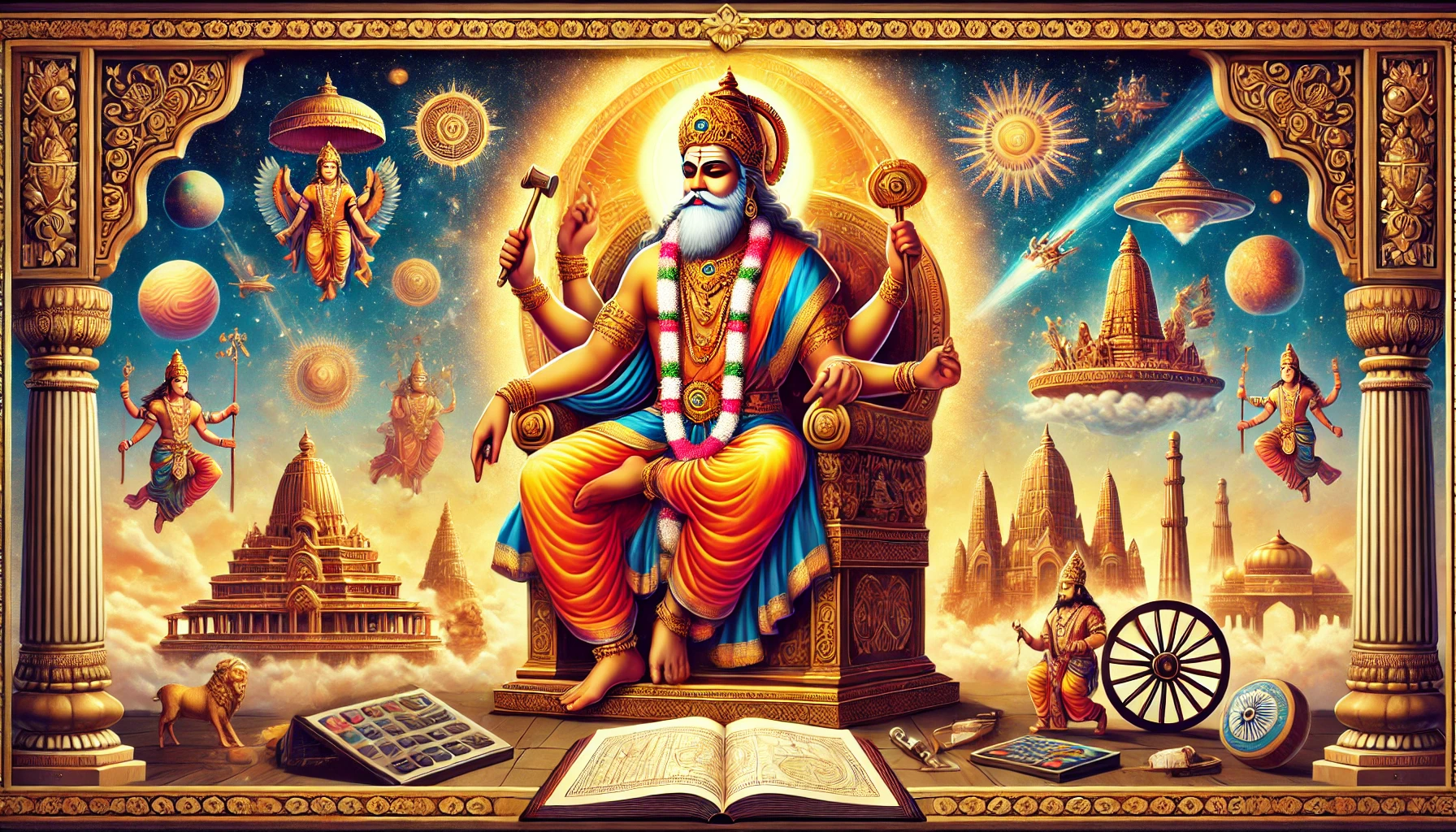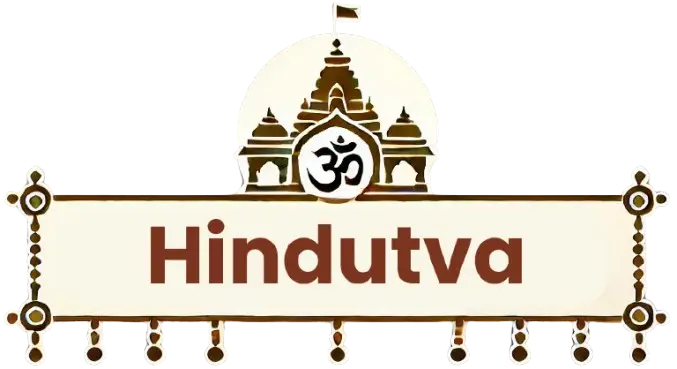Explore the legacy of Vishwakarma, the divine architect of the universe. Discover his mythological origins, creations, Vishwakarma Puja rituals, and lessons on creativity and craftsmanship.
In the vast pantheon of Hindu deities, Vishwakarma, the celestial architect, stands as a symbol of creativity, skill, and craftsmanship. Revered as the divine engineer of the universe, Vishwakarma is credited with designing and building some of the most magnificent and sacred structures in Hindu mythology. From the grand palaces of gods to their powerful weapons, Vishwakarma’s contributions have earned him a unique and unparalleled status among the deities.

Growing up in a family of artisans, I often heard stories of Vishwakarma during Vishwakarma Puja. My father, a carpenter by trade, would set aside his tools for the day, offering them to the deity in gratitude. It was a celebration of creativity, skill, and hard work—a tradition that continues to hold immense significance in my life. This article delves deep into the mythological origins, cultural significance, and timeless relevance of Vishwakarma, the divine architect of the universe.
The Mythological Origins of Vishwakarma
Vishwakarma’s roots are deeply embedded in Hindu mythology and the Vedas, where he is referred to as the ‘Divine Engineer’ or ‘Sthapati’. His name, derived from Sanskrit, translates to ‘all creator’, highlighting his role as the ultimate craftsman and creator of the cosmos.
Vishwakarma in Sacred Texts
- Rigveda: Vishwakarma is mentioned as the all-seeing and all-knowing cosmic creator, responsible for the design and construction of the universe. His description in the Rigveda portrays him as a supreme being who gave shape to the physical and spiritual worlds.
- Mahabharata and Ramayana: Vishwakarma is celebrated as the architect behind the grandeur of Indraprastha, the capital of the Pandavas, and Lanka, the golden city ruled by Ravana.
- Puranas: In the Puranas, Vishwakarma is depicted as the builder of legendary weapons like Vajra (Indra’s thunderbolt) and magnificent structures such as Swarga (Heaven) and Dwaraka, Lord Krishna’s underwater city.
Vishwakarma’s Contributions to Hindu Mythology
The legend of Vishwakarma is incomplete without discussing his unparalleled contributions to the world of gods and mortals. Here are some of his most remarkable creations:
- Swarga (Heaven)
Vishwakarma constructed Swarga, the abode of Lord Indra, with celestial opulence and architectural grandeur, adorned with unparalleled beauty and splendor. - Pushpaka Vimana
The Pushpaka Vimana, a mythical flying chariot, was another masterpiece crafted by Vishwakarma. Initially built for Kubera, the god of wealth, it was later taken by Ravana. - Dwaraka
Dwaraka, the underwater city of Lord Krishna, is one of Vishwakarma’s crowning achievements. Built as a fortress to protect Krishna’s people, Dwaraka is a testament to his ingenuity. - Lanka
The golden city of Lanka, ruled by Ravana, was originally built by Vishwakarma for Kubera. Its architectural brilliance remains unmatched in Hindu mythology.
Vishwakarma Puja: Honoring the Divine Craftsman
One of the most significant festivals dedicated to Vishwakarma is Vishwakarma Puja, celebrated by artisans, craftsmen, and engineers across India. This day is marked by rituals, prayers, and offerings to tools and machinery, acknowledging the deity’s blessings.
Rituals and Practices
- Tool Worship
On Vishwakarma Puja, tools, machinery, and instruments are worshipped as symbols of the deity’s blessings. Workers across various professions—from carpenters and blacksmiths to engineers—participate in this ritual. - Prayers for Prosperity
Devotees seek Vishwakarma’s blessings for success, innovation, and safety in their work. Special yagnas (sacrificial rituals) are performed to honor his contributions. - Community Celebrations
In many parts of India, especially in industrial hubs, Vishwakarma Puja is a community event, fostering unity and gratitude among workers.
For more on the rituals of Vishwakarma Puja, visit Hindupedia.
Vishwakarma’s Symbolism and Lessons for Today
Vishwakarma is more than a mythological figure; he is a symbol of creativity, dedication, and excellence. His story offers timeless lessons that resonate in the modern world:
- Embracing Creativity
Vishwakarma’s ability to design and build reflects the importance of innovation and creativity in every profession. - Respect for Craftsmanship
His worship emphasizes the value of skill, hard work, and attention to detail—qualities that are essential in any field. - Unity through Labor
Vishwakarma Puja unites people from diverse professions, highlighting the dignity of labor and the interconnectedness of all trades. - Adaptability and Innovation
Just as Vishwakarma adapted his creations to suit the needs of gods and mortals, today’s craftsmen and engineers must embrace innovation to solve modern challenges.
Personal Reflection: Vishwakarma in My Life
Growing up in a household that celebrated Vishwakarma Puja, I developed a deep respect for the tools and skills that shape our lives. My father’s reverence for his carpentry tools taught me the value of craftsmanship and the importance of honoring one’s work. I remember him saying, “Vishwakarma teaches us that no work is small, and every creation has its own divine purpose.”
These lessons stayed with me, guiding my approach to work and life. Whether writing articles or managing daily tasks, I strive to embody the dedication and creativity that Vishwakarma symbolizes.
Modern Relevance of Vishwakarma
In today’s world, Vishwakarma’s teachings hold profound relevance. As industries evolve and technology advances, the principles of innovation, dedication, and respect for craftsmanship remain as vital as ever. Efforts to preserve traditional crafts and celebrate Vishwakarma’s legacy play a crucial role in maintaining cultural and spiritual connections.
For ongoing initiatives to preserve craftsmanship, visit this cultural preservation site.
Vishwakarma, the Eternal Architect
Vishwakarma, the divine architect of the universe, represents the pinnacle of creativity, skill, and devotion. From designing celestial abodes to inspiring modern-day craftsmen, his legacy continues to shape the spiritual and cultural fabric of India. His worship, deeply rooted in tradition, reminds us to honor the tools and skills that build our world.
Whether you’re a devotee or someone seeking inspiration, Vishwakarma’s story offers timeless wisdom for embracing creativity, valuing labor, and striving for excellence. Let his legacy inspire us to build a world that reflects the same brilliance and harmony as his celestial creations.
Author:
Dr. Aryan Mishra – Historian & Cultural Analyst
Email: [email protected]

